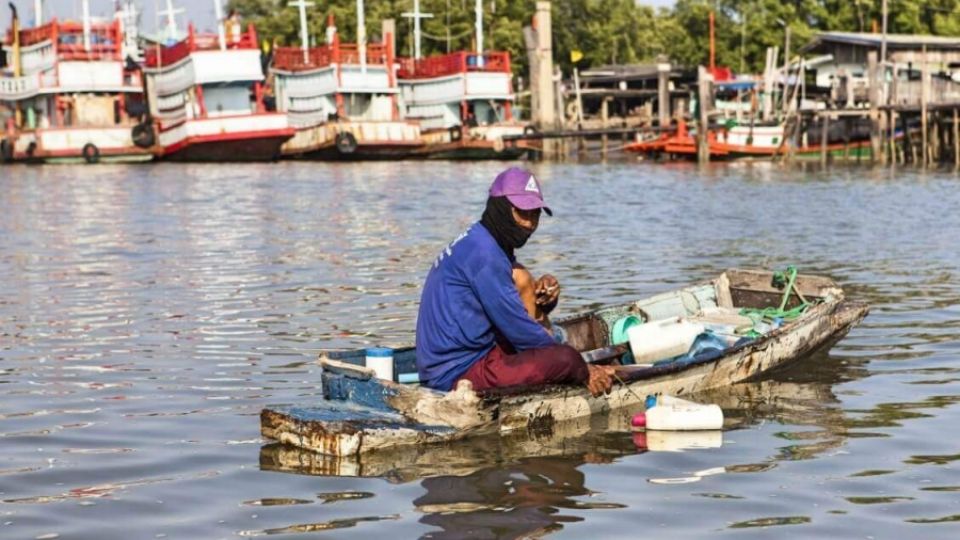The "Citizen Science Project" successfully enhanced the public participation for environmental and health protection in Thailand. Gold mining, contaminated water, and inadequate worker rights shall no longer be serious issues in the sites targeted by the program. Local communities have achieved significant changes also thanks to the help of non-governmental organizations EARTH and Arnika thus celebrating today's World Environment Day.
Increasing Transparency in Industrial Pollution Management through Citizen Science is a project funded by the European Union (EU). It encourages pollution-affected communities to generate scientific evidence about industrial pollution causing environmental and health damages. It has the objective to promote corporate accountability and citizen access to information about environmental issues. The activities are implemented by local NGO Ecological Alert and Recovery - Thailand (EARTH) together with Arnika NGO from the Czech Republic.
In the framework of the project, three community-based organizations were supported for a total amount of 9,000 EUR (approx. 335,000 THB) to implement activities reducing the impact of pollution in the life of Thai citizens.
The mediators for these activities were the Thai organization Ecological Alert and Recovery - Thailand (EARTH) and Prague-based NGO Arnika. “International cooperation allows us to export ideas, to improve mutual exchange in order to achieve environmental protection, and to raise awareness on environmental issues. We should recall that environmental issues ignore political borders,” Arnika’s expert on toxic pollution, Jitka Strakova highlights the principles of the United Nation’s World Environment Day celebrated on June 5th.
Right to compensation
Thanks to the EU funds, significant action was taken to support the Council of Work and Environment Related Patient's Network of Thailand (WEPT) which negotiates compensation for health damage for victims of pollution. In particular, workers in local factories often have no information on possible contamination from the workplace or on means to resolve the critical situation. Yet, the exposure to heavy metals and other toxic substances often leads to serious health problems and fatalities.
For example, a worker of a textile factory in Ang Thong Province fell into complete incapacity and was unable to work after being exposed to sulfur dioxide in the workplace. It was mainly thanks to WEPT that the man was eventually compensated with more than eighty-eight thousand Euros (3.4 million Thai bahts).
Many similar court trials have been facilitated by the organization. Some of these cases are still open. Additionally, WEPT educates the workers on their rights and the dangers that work in the factories brings.
Together for cleaner water
Meanwhile, pollution victims also received help from a group of active staff at the Samut Sakhon Hospital outside of Bangkok. Proximity to the Thai capital is the reason for high concentration of industrial sites in the area. These sites fundamentally influences the quality of water as proven by a conducted analysis. The findings, listed in the Report about the Environmental Impact on People Health Related to Water Pollution in Amphoe Muang Samut Sakhon, will be a key source of information for raising awareness and for lobbying both local authorities and responsible politicians.
In Loei Province, in the northeast of the country, locals have been farming on toxic soil which has been contaminated by sewage water from a nearby gold mine. The inhabitants of six nearby villages formed the Khao Luang Heritage Conservation Group (KLHCG). Through funds provided by the project, they improved cooperation in the region; they introduced regular monitoring of pollution levels in various locations.
More achievements followed, remarks director of EARTH, Penchom Saetang. “The community succeeded in having the remediation plan accepted by the Pollution Control Department in Wang Saphung District. Also, the KLHGC has been awarded for its active and enduring work,” Saetang mentions. He also noted the recently received Somchai Neelaphaijit Award which was named after a Thai lawyer and human rights defender who went missing in 2004.
Even though drinking water gets more and more precious every year, another urgent matter stole the attention of the UN’s World Environment Day: plastics. The World Environment Day, which this year is hosted in India, is the most important global event for encouraging worldwide awareness and action for the protection of our environment. It has been celebrated on June 5 since 1974. "In the past forty-four years, the globalised economy has brought more and more borderless environmental issues and risks that we have to face," Strakova concludes.
This email address is being protected from spambots. You need JavaScript enabled to view it.
Ecological Alert and Recovery - Thailand (EARTH) is an independent non-governmental organization striving for social and environmental sustainability and justice in Thai society. EARTH serves as a watchdog monitoring the Thai government’s industrialization policy, industrial pollution and unsustainable consumption patterns. It also promotes climate justice, good governance and accountability of governmental and international agencies. The main target of EARTH’s interest is the impacts of hazardous substances on ecosystems, local communities and workers’ health.
The European Union (EU) is the world's biggest development aid donor. Its development policy seeks to foster sustainable development and build a fairer and more stable world, concentrating in priority areas such as human rights, democracy and other aspects of good governance, and inclusive and sustainable growth. The Delegation of the European Union in Thailand is mandated to promote the political and economic relations between Thailand and the EU, inform the public of the development of the EU, and support the implementation of the EU’s assistance programmes.
This article was prepared and published as a part of the project “Increasing Transparency in Industrial Pollution Management through Citizen Science” funded by the European Union (EU) and co-funded by the Ministry of Foreign Affairs of the Czech Republic within the Framework of the Transition Promotion Programme – a financial assistance programme supporting democracy and human rights using the Czech Republic’s experience with social transition and democratization.
![]()







